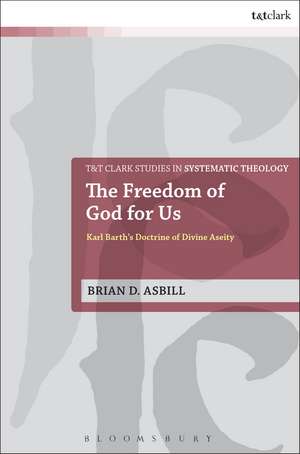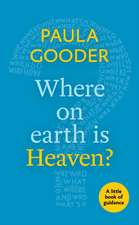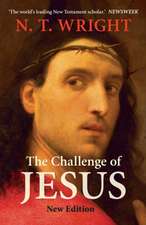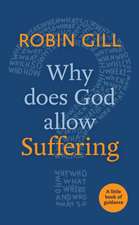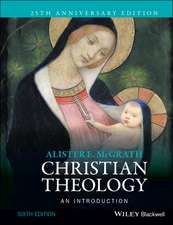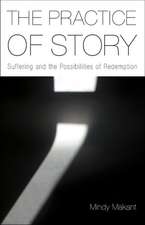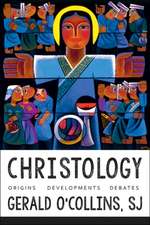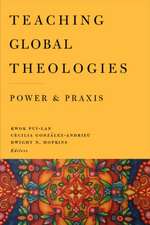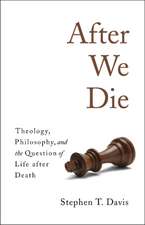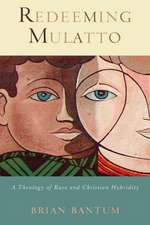The Freedom of God for Us: Karl Barth's Doctrine of Divine Aseity: T&T Clark Studies in Systematic Theology
Autor Brian D. Asbillen Limba Engleză Paperback – 27 iul 2016
| Toate formatele și edițiile | Preț | Express |
|---|---|---|
| Paperback (1) | 256.95 lei 43-57 zile | |
| Bloomsbury Publishing – 27 iul 2016 | 256.95 lei 43-57 zile | |
| Hardback (1) | 773.55 lei 43-57 zile | |
| Bloomsbury Publishing – 17 dec 2014 | 773.55 lei 43-57 zile |
Din seria T&T Clark Studies in Systematic Theology
- 22%
 Preț: 225.67 lei
Preț: 225.67 lei -
 Preț: 495.47 lei
Preț: 495.47 lei - 22%
 Preț: 236.54 lei
Preț: 236.54 lei -
 Preț: 257.12 lei
Preț: 257.12 lei - 22%
 Preț: 597.37 lei
Preț: 597.37 lei - 13%
 Preț: 256.59 lei
Preț: 256.59 lei - 13%
 Preț: 257.97 lei
Preț: 257.97 lei - 21%
 Preț: 216.70 lei
Preț: 216.70 lei - 22%
 Preț: 257.97 lei
Preț: 257.97 lei - 31%
 Preț: 889.88 lei
Preț: 889.88 lei -
 Preț: 257.03 lei
Preț: 257.03 lei - 13%
 Preț: 258.96 lei
Preț: 258.96 lei - 13%
 Preț: 257.59 lei
Preț: 257.59 lei - 13%
 Preț: 238.22 lei
Preț: 238.22 lei -
 Preț: 256.59 lei
Preț: 256.59 lei - 21%
 Preț: 217.17 lei
Preț: 217.17 lei - 22%
 Preț: 260.16 lei
Preț: 260.16 lei -
 Preț: 256.20 lei
Preț: 256.20 lei -
 Preț: 257.50 lei
Preț: 257.50 lei - 13%
 Preț: 224.58 lei
Preț: 224.58 lei - 22%
 Preț: 890.28 lei
Preț: 890.28 lei - 13%
 Preț: 258.42 lei
Preț: 258.42 lei - 22%
 Preț: 256.77 lei
Preț: 256.77 lei - 13%
 Preț: 258.69 lei
Preț: 258.69 lei - 22%
 Preț: 891.92 lei
Preț: 891.92 lei - 22%
 Preț: 232.72 lei
Preț: 232.72 lei - 31%
 Preț: 890.28 lei
Preț: 890.28 lei - 23%
 Preț: 223.20 lei
Preț: 223.20 lei - 22%
 Preț: 257.41 lei
Preț: 257.41 lei - 14%
 Preț: 947.94 lei
Preț: 947.94 lei - 22%
 Preț: 949.17 lei
Preț: 949.17 lei - 22%
 Preț: 256.95 lei
Preț: 256.95 lei - 30%
 Preț: 775.02 lei
Preț: 775.02 lei
Preț: 256.95 lei
Preț vechi: 330.91 lei
-22% Nou
Puncte Express: 385
Preț estimativ în valută:
49.18€ • 53.44$ • 41.34£
49.18€ • 53.44$ • 41.34£
Carte tipărită la comandă
Livrare economică 21 aprilie-05 mai
Preluare comenzi: 021 569.72.76
Specificații
ISBN-13: 9780567669537
ISBN-10: 056766953X
Pagini: 240
Dimensiuni: 156 x 234 x 19 mm
Greutate: 0.34 kg
Ediția:NIPPOD
Editura: Bloomsbury Publishing
Colecția T&T Clark
Seria T&T Clark Studies in Systematic Theology
Locul publicării:London, United Kingdom
ISBN-10: 056766953X
Pagini: 240
Dimensiuni: 156 x 234 x 19 mm
Greutate: 0.34 kg
Ediția:NIPPOD
Editura: Bloomsbury Publishing
Colecția T&T Clark
Seria T&T Clark Studies in Systematic Theology
Locul publicării:London, United Kingdom
Caracteristici
Fills a void in Barth scholarship, offering an in-depth examination of a superficially understood theme
Notă biografică
Brian D. Asbill received his Ph.D. from the University of Aberdeen and was used by theology departments at a variety of institutions throughout southern California. He has since joined the MBA class of 2016 at Cornell University.
Cuprins
ContentsAcknowledgementsAbbreviations Abstract1 Introduction PART 1. THE REALITY OF GOD2 Pronobeity-in-Aseity 3 Being-in-Action PART 2. THE LOVE AND FREEDOM OF GOD4 The Teleology of God 5 Personality and Aseity 6 Love in Freedom PART3. THE ASEITY OF GOD7 An Anatomy 8 A Paraphrase 9 Conclusion Bibliography Index
Recenzii
An indispensable entry . to the wider field of studies concerning Barth's doctrine of God [and] . to the most heated debates in contemporary systematic theology 'after Barth'.
In this careful and thoroughly researched work, Brian D. Asbill shows that for Barth God's "aseity" -- his full self-sufficiency in himself as the Holy Trinity -- is the depth of God's being to all eternity. For Barth, this eternal depth of being means that there is no electing God prior to the Trinity. Asbill thus adds his powerful voice to the growing chorus of interpreters who would affirm the idea, on the basis of meticulous study, that for Barth the Trinity serves as the ground of pre-temporal election, not the other way around.
Divine aseity and the question of the relation between God's own triune life and God's act toward what is not God have been disputed in much of the Christian theological tradition, and the debate is lively to this day. Brian D. Asbill's book, one of many fine studies produced under the guidance of John Webster, expertly traces these matters through Barth's ouvre and presents their benefits when aseity is not reduced to a negative sort of freedom 'from' the world, abstracted from divine love. The result is a compelling study of Barth's doctrine of the triune God who, in God's overflowing love, freely binds Godself to the world.
The aseitas Dei echoes throughout the halls of the Christian tradition. Barth, of course, is no exception. In this study, Dr. Asbill explores the convergence of this concept and this theologian. In doing so, he presents his readers with not so much a tour de force as a tour of the key issues. Committing to leave no stone unturned, he may prolong this most prodigious journey into the divine mysteries, but he indeed arrives at a most unmistakable destination. Some may still ask, 'why study divine aseity'? Asbill, for his part, quells such doubts with a resounding 'why not'.
A seriously researched, carefully argued, and interpretatively rich work, Brian Asbill's The Freedom of God for Us is an impressive contribution to Barth studies. Close attention to the nuances of Barth's work, complemented by a laudable sense for the rhythm and cadences of the Dogmatics as a whole, guarantee this work a wide and appreciative readership.
In this careful and thoroughly researched work, Brian D. Asbill shows that for Barth God's "aseity" -- his full self-sufficiency in himself as the Holy Trinity -- is the depth of God's being to all eternity. For Barth, this eternal depth of being means that there is no electing God prior to the Trinity. Asbill thus adds his powerful voice to the growing chorus of interpreters who would affirm the idea, on the basis of meticulous study, that for Barth the Trinity serves as the ground of pre-temporal election, not the other way around.
Divine aseity and the question of the relation between God's own triune life and God's act toward what is not God have been disputed in much of the Christian theological tradition, and the debate is lively to this day. Brian D. Asbill's book, one of many fine studies produced under the guidance of John Webster, expertly traces these matters through Barth's ouvre and presents their benefits when aseity is not reduced to a negative sort of freedom 'from' the world, abstracted from divine love. The result is a compelling study of Barth's doctrine of the triune God who, in God's overflowing love, freely binds Godself to the world.
The aseitas Dei echoes throughout the halls of the Christian tradition. Barth, of course, is no exception. In this study, Dr. Asbill explores the convergence of this concept and this theologian. In doing so, he presents his readers with not so much a tour de force as a tour of the key issues. Committing to leave no stone unturned, he may prolong this most prodigious journey into the divine mysteries, but he indeed arrives at a most unmistakable destination. Some may still ask, 'why study divine aseity'? Asbill, for his part, quells such doubts with a resounding 'why not'.
A seriously researched, carefully argued, and interpretatively rich work, Brian Asbill's The Freedom of God for Us is an impressive contribution to Barth studies. Close attention to the nuances of Barth's work, complemented by a laudable sense for the rhythm and cadences of the Dogmatics as a whole, guarantee this work a wide and appreciative readership.
